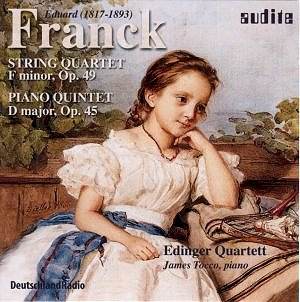Audite have rescued the music of Breslau-born
composer Eduard Franck from oblivion. At the invitation of Ferdinand
Hiller, Franck became one of the eminent lights of Cologne's musical
life. Hiller rejuvenated the cathedral city's music with other
figures too, Theodor Pixis and Carl Reinecke amongst them. Franck,
a pupil of Mendelssohn, was lured to the city from Berlin. Franck
conducted the choral society. His own works were included in the
Concert Society's programmes.
The String Quartet in F minor Op. 49 is
Mozartian but infused with a more modern Mendelssohnian sensibility.
It has a swimmy sense of flow with fugal activity (4.48 in I)
and something of the Viennese flâneur in the last two (of
four) movements. The Adagio Molto Espressivo has the Olympian
calm of the Schubert String Quintet. The Piano Quintet has
the tempestuous nature of the first Brahms Piano Concerto offset
somewhat by the sort of childlike simplicity we have come to associate
with Mozart's simple sets of variations. The later movements track
through sturdy village dances, weighty hymnal seriousness and
rude virtuoso energy. There is much more Schumann in the last
movement which sports a conventional 'flashed' ending.
Civilised chamber music partly in the shadow
of Schumann and Mendelssohn.
Rob Barnett
